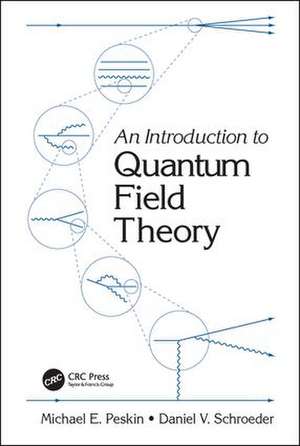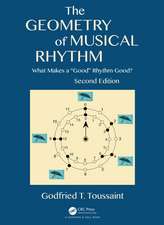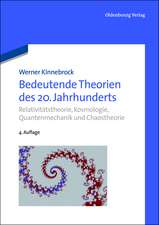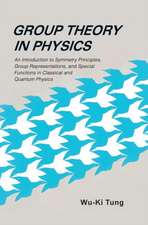An Introduction To Quantum Field Theory
Autor Michael E. Peskin, Daniel V. Schroederen Limba Engleză Paperback – 11 sep 2019
After presenting the basics of quantum electrodynamics, the authors discuss the theory of renormalization and its relation to statistical mechanics, and introduce the renormalization group. This discussion sets the stage for a discussion of the physical principles that underlie the fundamental interactions of elementary particle physics and their description by gauge field theories.
| Toate formatele și edițiile | Preț | Express |
|---|---|---|
| Paperback (1) | 466.88 lei 3-5 săpt. | +46.52 lei 7-11 zile |
| CRC Press – 11 sep 2019 | 466.88 lei 3-5 săpt. | +46.52 lei 7-11 zile |
| Hardback (1) | 840.58 lei 3-5 săpt. | +51.59 lei 7-11 zile |
| CRC Press – 2 oct 1995 | 840.58 lei 3-5 săpt. | +51.59 lei 7-11 zile |
Preț: 466.88 lei
Preț vechi: 507.48 lei
-8% Nou
Puncte Express: 700
Preț estimativ în valută:
89.35€ • 97.02$ • 75.05£
89.35€ • 97.02$ • 75.05£
Carte disponibilă
Livrare economică 01-15 aprilie
Livrare express 18-22 martie pentru 56.51 lei
Preluare comenzi: 021 569.72.76
Specificații
ISBN-13: 9780367320560
ISBN-10: 0367320568
Pagini: 868
Dimensiuni: 156 x 234 x 57 mm
Greutate: 1.18 kg
Ediția:1
Editura: CRC Press
Colecția CRC Press
ISBN-10: 0367320568
Pagini: 868
Dimensiuni: 156 x 234 x 57 mm
Greutate: 1.18 kg
Ediția:1
Editura: CRC Press
Colecția CRC Press
Public țintă
Undergraduate CoreCuprins
Part I: Feyman Diagrams and Quantum Elctrodynamics
Invitation: Pair Production in e * r e ~ Annihilation
The Klein Gordon Field
The Dirac Field
Interacting Fields and Feynman Diagrams
Elementary Processes of Quantum Electrodynamics
Radiative Corrections: Introduction
Radiative Corrections: Some Formal Developments
Part II: Renormalization
Invitation: Ultraviolet Cutoffs and Critical Flucutations
Functional Methods
Systematics of Renormalization
Renormalization and Symmetry
The Renormalization Group
Critical Exponents and Scalar Field Theory
Part III: Non-Abelian Gauge Theories
Invitation: The Parton Model of Hadron Structure
Non-Abelian Gauge Invariance
Quantization of Non-Abelian Gauge Theories
Quantum Chromodynamics
Operator Products and Effective Vertices
Pertubation Theory Anomalies
Gauge Theories with Spontaneous Symmetry Breaking
Quantization of Spontaneously Broken Gauge Theories
Quantum Field Theory at the Frontier
Invitation: Pair Production in e * r e ~ Annihilation
The Klein Gordon Field
The Dirac Field
Interacting Fields and Feynman Diagrams
Elementary Processes of Quantum Electrodynamics
Radiative Corrections: Introduction
Radiative Corrections: Some Formal Developments
Part II: Renormalization
Invitation: Ultraviolet Cutoffs and Critical Flucutations
Functional Methods
Systematics of Renormalization
Renormalization and Symmetry
The Renormalization Group
Critical Exponents and Scalar Field Theory
Part III: Non-Abelian Gauge Theories
Invitation: The Parton Model of Hadron Structure
Non-Abelian Gauge Invariance
Quantization of Non-Abelian Gauge Theories
Quantum Chromodynamics
Operator Products and Effective Vertices
Pertubation Theory Anomalies
Gauge Theories with Spontaneous Symmetry Breaking
Quantization of Spontaneously Broken Gauge Theories
Quantum Field Theory at the Frontier
Notă biografică
Micheal E. Peskin received his doctorate in physics from Cornell University and has held research appointments in theoretical physics at Harvard, Cornell, and CEN Saclay. In 1982, he joined the stafff of the Stanford Linear Accelerator Center, where he is now Professor of Physics.
Daniel V. Schroeder received his doctorate in physics from Stanford University in 1990. He held visiting appointments at Pomona College and Grinnell College before joining the faculty of Weber State University, where he is now Associate Professor of Physics.
Daniel V. Schroeder received his doctorate in physics from Stanford University in 1990. He held visiting appointments at Pomona College and Grinnell College before joining the faculty of Weber State University, where he is now Associate Professor of Physics.
Recenzii
"This is such a serious competitor to Bjorken and Drell that I fear for our royalties."
—Prof. J.D. Bjorken, Stanford Linear Accelerator Center
"I have used the text of Peskin and Schroeder in teaching several graduate courses. It provides students with nearly all the tools required of the modern field theorist. It is the only field theory text with a thoroughly modern, Wilsonian treatment of renormalization and the renormalization group. Students are left well equipped to tackle research problems in QCD and the electroweak theory."
—Prof. Michael Dine, University of California, Santa Cruz
"Peskin and Schroeder have written an introductory field theory textbook with the right choice of material at the right level and all presented from a completely modern point of view. It provides a pedagogical introduction to the tools and concepts of field theory that will be of use to students of condensed matter, cosmology, and particle physics alike."
—Prof. Jeffrey Harvey, University of Chicago
—Prof. J.D. Bjorken, Stanford Linear Accelerator Center
"I have used the text of Peskin and Schroeder in teaching several graduate courses. It provides students with nearly all the tools required of the modern field theorist. It is the only field theory text with a thoroughly modern, Wilsonian treatment of renormalization and the renormalization group. Students are left well equipped to tackle research problems in QCD and the electroweak theory."
—Prof. Michael Dine, University of California, Santa Cruz
"Peskin and Schroeder have written an introductory field theory textbook with the right choice of material at the right level and all presented from a completely modern point of view. It provides a pedagogical introduction to the tools and concepts of field theory that will be of use to students of condensed matter, cosmology, and particle physics alike."
—Prof. Jeffrey Harvey, University of Chicago
Descriere
This is a textbook intended for the graduate physics course covering relativistic quantum mechanics, quantum electrodynamics, and Feynman diagrams. The authors make these subjects accessible through carefully worked examples illustrating the technical aspects of the subject, and intuitive explanations of what is going on behind the mathematics.
